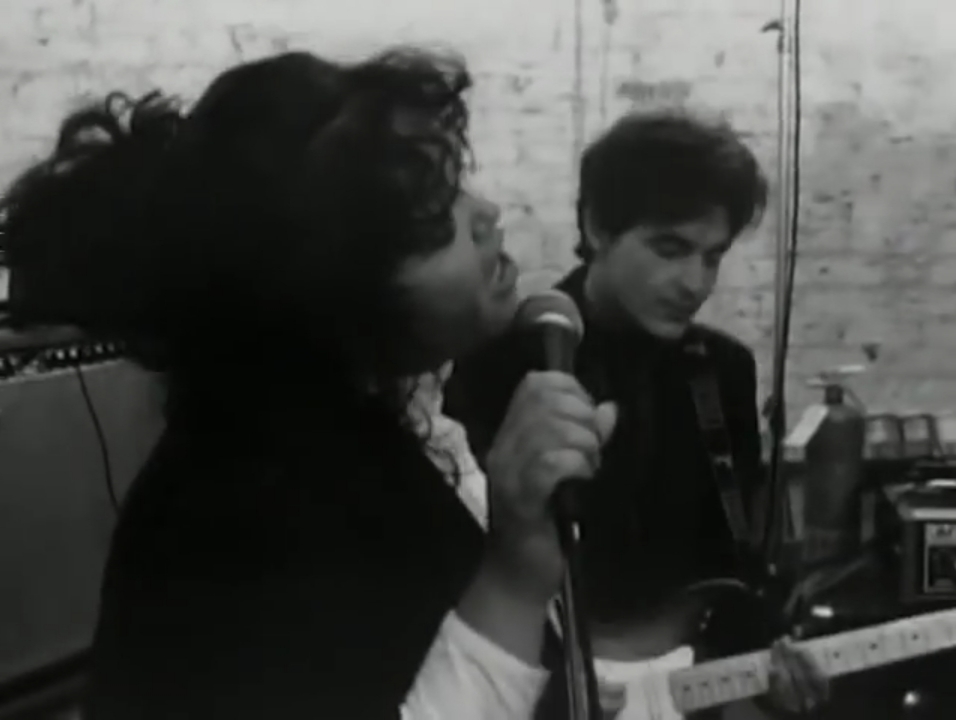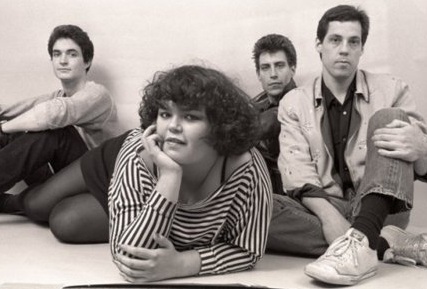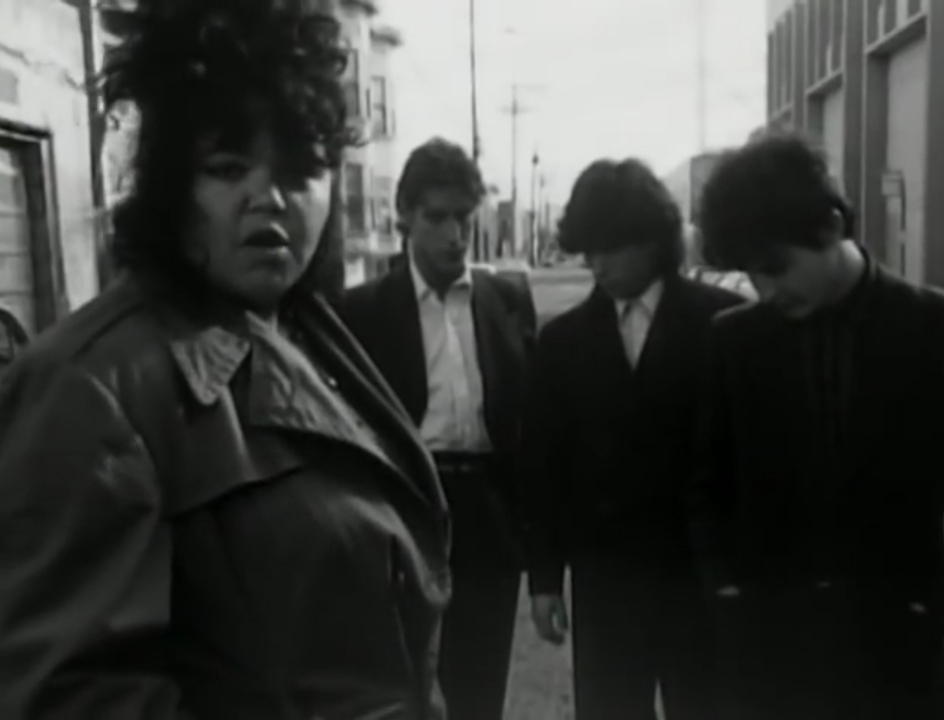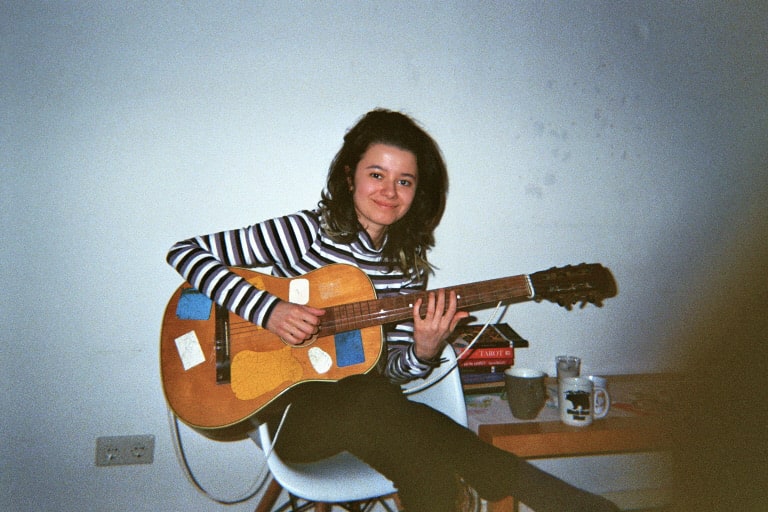Women who occupy a certain online niche – an embarrassing way to say women such as myself – were lucky to enter the late teens of this millennia armed with a definitive declaration of nothingness, courtesy of writer Audrey Wollen’s Instagram.
BEWARE MALE ARTISTS MAKING ARTWORK ABOUT EMPTINESS
NOTHING DOES NOT BELONG TO YOU
GIRLS OWN THE VOID
BACK OFF FUCKERS!!!!
she wrote, the catechisms floating around crudely crossed-out thumbnails of famous art-world appropriations such as John Cage’s 4’33”, Yves Klein’s “Void”, and Robert Barry’s “Inert Gas”.1 The meme gathered steam in a series of roiling double-taps and hearts, screenshots and retweets, and eventually, i.r.l. graffiti, now hashtagged, indexed, and archived in the social media matrix2:
GIRLS OWN THE VOID
BACK OFF FUCKERS!!!!
As a manifesto, it’s brash, ironic, and stands up to scrutiny. If girls don’t get to have anything, then they better at least have proprietary rights to nothing, Wollen’s saying; if the world won’t give us something, at least let us have that3. The use of ‘void’ gleams dangerously in her constellation; while ‘emptiness’ or ‘nothing’ can be read as poverty, ‘void’ compounds the lack so intensely that what was once flimsy and insubstantial becomes extreme power. The void is hardcore.
‘Hardcore’, like ‘punk’, is one of those terms that could probably be assigned structured qualifications, but that sort of uptight verbal fascism would defeat the point. So if I told you that Debora Iyall, frontwoman of 80s new wave band Romeo Void and an obvious ancestor to these young, female cyberpunks clinging to the Void had by her late teens run away to Haight-Ashbury, come back, dropped out of high school, joined the AIM occupation of Alcatraz Island, started sitting in on college poetry classes, and jumped onstage with Joan Baez at an anti-war rally, you wouldn’t run through a checklist in your head, but you might say wow, yeah, hardcore.

In 2021, Iyall, Mother of the Void, first of her name, teaches high-school art, maintains a wholesome Instagram and a healthy involvement in the regional southern California music scene, is unfailingly polite even at her most candid, and yeah, is still hardcore midway through her 60s.
“What baffles me about a lot of current musicians is it’s not sexy,” she says over the phone from her home in the Coachella Valley, perturbed on behalf of younger generations but not critical, exactly—presumably, just distantly fretting they might be denied their due bit of fun and pleasure. “No one’s getting down and feeling those sexual feelings.”
“Not only did Iyall not care if you liked her... but her only mission was to be heard.”
Listening to Romeo Void makes me regret that Ellen Willis moved on from rock criticism just before the band’s 1981 debut, It’s a Condition. Not only would their mix of brassy post-punk have surely passed Willis’ personal smell test (stand in front of her full-length mirror with a Walkman and dance), but Iyall is a good answer to the complications Willis saw arising in the burgeoning, self-declared feminist acts of the 70s, nearly all of whom but Patti Smith failed to win the hyper-intellectual writer over. After watching a middling “feminist folk-punk band” perform live, Willis wrote in her 1977 essay “Beginning to See the Light”:
They did not have the confidence, or the arrogance, to say or feel “If you don’t like it, tough shit.” It was not that I thought performers should be indifferent to the response of their audience. I just thought that the question they ought to ask was not “How can I make them like me?” but “How can I make them hear me?”
Not only did Iyall not care if you liked her—“You don’t get it? Rain on you” she deadpans rhetorically in “Orange”—but her only mission was to be heard. “I don’t know if you know that Animals song ‘Please Don’t Let Me Be Misunderstood’,” she says before pausing, graciously careful to listen back; “but I always felt misunderstood.” No wonder, then, that several times she namechecks It’s a Condition closer “I Mean It” as one of her own favorite songs.
Like Ellen Willis, Iyall found a rock heroine in Patti Smith, but as an indigenous woman with curves, she wasn’t able to put on a slim suit and act the Dylan wannabe. Not that she wanted to. “I was willing to say, we have a new aesthetic, we’re replacing that, you know?” says Iyall, sensitive to the nuances of self-presentation. Growing up in majority-white area of Fresno, she was kicked out of school for wearing a traditional native headband despite her Cowlitz heritage; early in Romeo Void’s first album, she excoriates the black-jean uniform of an overly homogenous punk scene. She wore her own pants, and let her hair be: “I’m Native American,” she says, still staunch. “I’m not going to bleach my hair blonde.”
Romeo Void was reactive to the needs Iyall perceived in the scene, not only by being anti-aesthetic, but anti-apathy. “We were tired of everyone acting really detached and cool and leaning against the wall, and we wanted people to dance again,” Iyall recalled in an interview last year.
“...Iyall found a rock heroine in Patti Smith, but as an indigenous woman with curves, she wasn’t able to put on a slim suit and act the Dylan wannabe. Not that she wanted to.”
The secret formula ended up being a mixture of sex appeal and sax appeal. Romeo Void hit the clubs a few years after Poly Styrene & the X-Ray Spex’s “Oh Bondage! Up Yours” proved the saxophone’s contemporary music potential, and in Benjamin Bossi’s hands, the instrument retained the same melodic qualities which rendered it such a contrast to the chaos of the Spex. But set within Romeo Void’s pop approach it sang, fluxing between emotive highs and lows behind Iyall’s snarled scene reports.
Energetically itself, the band was flush with early success: local popularity; national tours; an EP co-produced by the Cars’ Ric Ocasek, by his request. Which is not to say Iyall graduated out of being misunderstood. The legend goes (and Iyall agrees, if an interviewer catches her in the right mood) that Columbia yanked their support when execs noticed the singer of the politically-minded project they were bankrolling wasn’t exactly Debbie Harry. The news arrived mid-tour; a disheartened and tense Romeo Void would disintegrate a year later.
Ironically, despite this top-down messaging about palatability and desirability, going by the numbers Romeo Void-–a band not short on jams—performed best when Iyall shamelessly foregrounded her lust. “I might like you better if we slept together,” she spits bluntly in the chorus of “Never Say Never”, which remains one of Romeo Void’s best-known cuts.
“Romeo Void was reactive to the needs Iyall perceived in the scene, not only by being anti-aesthetic, but anti-apathy.”
Still, Iyall wasn’t playing a sex kitten card. “I don’t say I’m anybody’s object,” she clarifies. “I don’t objectify myself. If I’m showing off my tits, it’s because I want you to see my tits – not because I want you to want me.” And she’s right. Romeo Void songs always favored frankness over coyness. The audience wasn’t responding to a gambit for desire, but the expression of naked desire itself.
Sex, romance, and love appear as discrete topics throughout the Romeo Void catalogue, a delineation which should make any modern person fall to their knees to say thank God! They’ve never been the same; Hallmark and Hollywood just tried to package them that way, dulling the excitement of all three.

Photography courtesy of Chester Simpson
Along with “A Girl in Trouble (is a Temporary Thing)” and “Never Say Never,” single “Talk Dirty to Me” rounded out the band’s hits, a trend which may unfairly cast the group in a thoroughly lovesick and nymphomanic light. Iyall is a talented poet, and her lyrics capture the same multiplicity as one of her influences, Toni Morrison: “It felt so wonderful to read a writer like her, who could write about those very specific personal moments, yet you got this huge worldview from her as well–how she saw those individual lives and situations and moments fit into the bigger picture.”
And while Iyall, who served as the main songwriter, is obsessed with relationships, that reading obscures her keen political acuity. If Romeo Void is all about love, it’s in the bell hooks way, and as bell hooks wrote in her book-length meditation on the topic, there can be no love without justice.
“If Romeo Void is all about love, it’s in the bell hooks way, and as bell hooks wrote in her book-length meditation on the topic, there can be no love without justice.”
Iyall, in intellectual kinship with hooks, spends time considering justice at a micro-level in accountability and honesty to one another. She has no patience for men plying allyship for vanity, lacerating the offender with crushing disdain in songs like “Your Life is a Lie,” which pretty much says it all in the title. (Commie Cosmo tip for the revolution: Being a self-avowed socialist doesn’t necessarily mean a man is into equal distribution in bed.)
The simple question is if someone can’t live out their political ideals on the smallest possible scale in an intimate relationship, how can that person possibly exercise them in the grand struggle? The disconnect is curious and jarring but altogether unsurprising; sexual misbehavior is endemic, even in the men who see themselves as socially-conscious allies. “Progressive” history is dotted with careerists who plead political purity while dabbling in imbalanced affairs and selfish coercion4.

This is the sort of shallow hypocrisy which sickened Ellen Willis, an even more vivid and passionate writer on politics than music, and for whom feminist sexual liberation was essential to broader revolution. Any disconnect between the political and the personal is a fallacy, and even in the raunchier songs, Iyall gets her political jabs in. While the title of Romeo Void’s greatest hits collection, Warm, in Your Coat, implies the coziness of the traditional romantic gesture, in “Never Say Never” the line lands as a jab at a date about class divides. “A Girl in Trouble (Is a Temporary Thing)” is an enraged response to the dismissive stance Michael Jackson takes towards an unwed mother in “Billie Jean”. Tracks such as “Out on My Own” and “Not Safe” explicitly discuss instability and economic insecurity.
Iyall, in short, is a master of both camouflaged political songwriting and the niche category of a political double-entendre, because whatever is going on her love life, she can’t help seeing the politics in play, both in her bedroom and in the world humming by outside.
“I have to face the world I inhabit,” she sings in the song “Present Tense”. Even though, as she follows, “I hate the world I inhabit”—an admission which makes her persistence all the more critical. As Willis wrote in her 1992 essay collection No More Nice Girls, “In the long run, we can only win if women (and men) want freedom (and love) more than they fear its consequences.”
The title track of Instincts, Romeo Void’s final album, is one of their most beautiful, and a reminder they wrote very few—if any other—traditional love songs. It’s unmistakably Romeo Void, but not the Romeo Void of “Love Is An Illness”. Iyall’s knives are packed away. Gone is the defensive callousness, gone is the pugnacious posturing, gone even are the extreme highs and lows: Bossi’s sax floats along in an easy sine wave, and Iyall is restrained, even hushed. “That was written for my first husband,” she says. “The part of me that’s still the kid – that vulnerable, hurt part, was just taken care of a little bit, you know?” As a goodbye of sorts, it seems the best possible answer to all of the problems Romeo Void posed to their audience.
“Romeo Void songs always favored frankness over coyness. The audience wasn’t responding to a gambit for desire, but the expression of naked desire itself.”
After the band broke up, Iyall released a solo LP, Strange Language, and in the 90s began her career as an art educator; two more solo records followed in 2010 and 2012, prompting new appearances such as one on a wonderfully bizarre webshow (fittingly titled Bottomless Pit). And now——
Toward the end of our call, Iyall cuts me off with extreme tact. “I go swimming every day, and it’s time to get in,” she says. “I kind of do a deep-water aerobics thing rather than doing laps. I mean, I have playlists that I dance in the water to.”
A lifelong swimmer, Iyall’s hobby now allows her to evade the pain of arthritis. Buoyancy is a funny feeling, a way to absent physical and mental stress in a suspended state of near-weightlessness, zero-gravity on the cheap. “Getting in the water is like—I’m free again, I’m young again, I can jump around again!” Iyall cries with palpable joy.
And she hangs up the phone, and I can imagine her out there in the Sonoran desert, going out back to set up her playlist and slink into the deep end in the shadow of the mountains, where she’ll dance for an hour in the gentle embrace of the void.
______________
(1) https://www.instagram.com/p/830V1EszbT/
(2) The void is a hole. The void is something you fall into, with very little promise of ever getting out. The void is maybe a lot like Instagram.
(3) Women, who are now so conscious of their relationship to taking up space, don’t have to look far in any direction to connect with emptiness as a theme. There are diets, of course, and hunger, and not speaking, and not thinking, but also marketing measures with broader aims: The sanctity of potential says that a woman must embrace her spaciousness as identity while also being willing to give it up. Recent anti-abortion measures seem to say that if a woman rejects the role of being a productive empty space, then she is a criminal to society; then she has forgone her use. Writing about vaginoplasty for n+1, Andrea Long Chu repeats what cis women have told her: “They tell me that there is no universal experience of being a woman, except that no woman actually feels like a woman; they tell me that in fact, being a woman feels like nothing at all.”.
(4) Bill Clinton comes to mind, but feel free to fill in the blanks on others.
______________
Check out Deborah Iyall’s latest collaboration with Owen Masterson here.
Listen back to some of Romeo Void’s hits, curated by our writer Charlotte Murtishaw, below:


